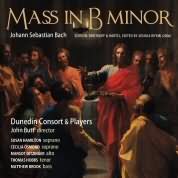John Butt and his Dunedin Consort & Players are back with another large-scale Bach masterpiece, performed in accordance with Joshua Rifkin’s fascinating, exhaustively-researched arguments for employing one-voice-to-a-part in the choral works. This also is the premiere recording using Rifkin’s recently published scholarly edition of the B minor Mass, which purports to have cleared away “improvements” inflicted on the score after Bach’s death, and presents the work as faithfully as possible in Bach’s final conception.
I say “fascinating” above, but I don’t mean “entirely convincing”–there remains too much speculation in the argument, and my continuing question is still not answered: what exactly would have been Bach’s purpose in employing such small vocal forces for works, like the St. Matthew Passion and B minor Mass, that clearly were not so minimally conceived? There certainly is nothing in the structure of the music itself that suggests it could only be properly realized by a bare minimum of participants.
As one who spent many years as a necessarily “practical” church musician, I believe that the truth is neither so revolutionary nor worthy of such determined study. When I selected or wrote a piece for my choir, I was always mindful of the possibility of someone falling ill, suddenly going out of town, forgetting to show up, etc. So I made sure that the work was performable by “the barest minimum” of singers, but of course I would have preferred and gladly would have accepted more rather than less people in the choir to make the sound fuller and more powerful, and to ensure that no one had to carry the full load of a part. In the case of the Passions or the B minor Mass, laying so much music on a handful of singers doesn’t seem practical or wise–unless of course you have the luxury of choosing top-notch professionals as is the case here (so much for period authenticity).
Good blend and balance also are easier to achieve with more voices–except, again, if you have the luxury of hand-picking your four or five solo singers (there is plenty of evidence that Bach did not have this option). And if the reason for taking Rifkin’s one-to-a-part approach is authenticity, the whole thing falls flat unless you are using only male singers, including teenage boys who still sing soprano and alto as they were capable of in Bach’s day. Certainly the sound that reaches our ears is more important from a historical-accuracy perspective than the exact number of people used to recreate it. So what if you can perform the B minor Mass with seven or eight or ten people–or a chorus of chipmunks–if it sounds weak or forced or frantic or desperate? Oh yes, the modern recording studio and its magical technology can work wonders, but this is far from the point. (For further discussion of my views on this subject, see my review of these same performers’ St. Matthew Passion in the Reviews archive.)
And speaking of performances: those on this recording are actually very fine, particularly in regard to the quality, technical ability, and command of Bach style demonstrated by each of the individual voices. When they sing in ensemble, of course you notice the singular attributes of each voice–which to me is a distraction better left where you expect it, in the Romantic-era drawing room of Brahms’ Liebeslieder. There’s no lack of energy, no compromise in phrasing or dynamic intensity (thanks largely to engineering that places the singers rather close), and you really can’t complain about the vibrant, natural sound. For a while you can really lose yourself in this performance–and many of the arias are as fine as you’ll hear anywhere; Margot Oitzinger’s Agnus Dei is to die for. But the singers seem to be working way too hard in the big choruses, against a terrific (and much larger) instrumental ensemble that just does its thing without any hint of similar effort. As you listen you’re just too aware of the process to be able to move from noticing every detail to appreciating the greater design of Bach’s masterpiece.
































